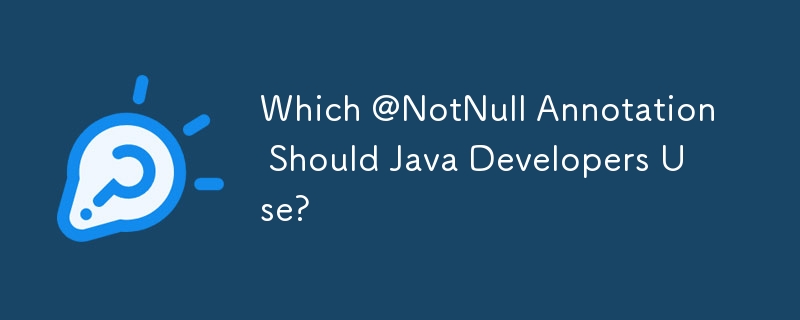Which @NotNull Annotation Should Java Developers Use?

What @NotNull Java Annotation Should You Use?
Understanding the Issue
Many Java developers seek to improve their code readability and leverage tooling to prevent NullPointerExceptions. However, the multitude of available @NotNull annotations can be confusing and incompatible, leading to the question: which annotation is the most suitable for your needs?
Comparing Available Annotations
There are several @NotNull annotations available, each with its own purpose and compatibility. These include:
- javax.validation.constraints.NotNull (for runtime validation)
- edu.umd.cs.findbugs.annotations.NonNull (used by FindBugs/SpotBugs)
- javax.annotation.Nonnull (inactive JSR-305 annotation)
- org.jetbrains.annotations.NotNull (used by IntelliJ IDEA)
- lombok.NonNull (for Project Lombok)
- androidx.annotation.NonNull (available in Android)
- org.eclipse.jdt.annotation.NonNull (used by Eclipse)
Pragmatic Solution
Some debate exists around the ideal @NotNull annotation due to the dormancy of JSR 305. However, in practice, choosing the most appropriate annotation depends on your specific tooling and preferences.
Syntax Recommendations
For readability and platform independence, it's preferable to avoid IDE-specific or framework-dependent annotations like org.jetbrains.annotations.
javax.annotation: A Balanced Approach
Based on syntax and support, javax.annotation is a reasonable choice. It's shorter than javax.validation.constraints and doesn't introduce additional dependencies like JEE.
Implementation Variability
While many @NotNull annotations have similar syntax, their implementations differ.
- Runtime vs. Compile Time: javax.annotation, javax.validation.constraints, and org.checkerframework.checker.nullness.qual are runtime annotations, while others are compile-time annotations.
- Usage Context: Some annotations support only specific code contexts (e.g., fields, methods, parameters) while others have broader support.
Conclusion
Choosing the appropriate @NotNull Java annotation involves considering factors like syntax, implementation, and compatibility with your tooling. By understanding the options available and their distinctions, you can select the annotation that best meets your needs. It's important to note that a definitive "best" annotation may not exist, and a pragmatic approach that aligns with your specific usage context is recommended.
The above is the detailed content of Which @NotNull Annotation Should Java Developers Use?. For more information, please follow other related articles on the PHP Chinese website!

Hot AI Tools

Undresser.AI Undress
AI-powered app for creating realistic nude photos

AI Clothes Remover
Online AI tool for removing clothes from photos.

Undress AI Tool
Undress images for free

Clothoff.io
AI clothes remover

Video Face Swap
Swap faces in any video effortlessly with our completely free AI face swap tool!

Hot Article

Hot Tools

Notepad++7.3.1
Easy-to-use and free code editor

SublimeText3 Chinese version
Chinese version, very easy to use

Zend Studio 13.0.1
Powerful PHP integrated development environment

Dreamweaver CS6
Visual web development tools

SublimeText3 Mac version
God-level code editing software (SublimeText3)

Hot Topics
 1664
1664
 14
14
 1422
1422
 52
52
 1316
1316
 25
25
 1267
1267
 29
29
 1239
1239
 24
24
 Is the company's security software causing the application to fail to run? How to troubleshoot and solve it?
Apr 19, 2025 pm 04:51 PM
Is the company's security software causing the application to fail to run? How to troubleshoot and solve it?
Apr 19, 2025 pm 04:51 PM
Troubleshooting and solutions to the company's security software that causes some applications to not function properly. Many companies will deploy security software in order to ensure internal network security. ...
 How do I convert names to numbers to implement sorting and maintain consistency in groups?
Apr 19, 2025 pm 11:30 PM
How do I convert names to numbers to implement sorting and maintain consistency in groups?
Apr 19, 2025 pm 11:30 PM
Solutions to convert names to numbers to implement sorting In many application scenarios, users may need to sort in groups, especially in one...
 How to simplify field mapping issues in system docking using MapStruct?
Apr 19, 2025 pm 06:21 PM
How to simplify field mapping issues in system docking using MapStruct?
Apr 19, 2025 pm 06:21 PM
Field mapping processing in system docking often encounters a difficult problem when performing system docking: how to effectively map the interface fields of system A...
 How does IntelliJ IDEA identify the port number of a Spring Boot project without outputting a log?
Apr 19, 2025 pm 11:45 PM
How does IntelliJ IDEA identify the port number of a Spring Boot project without outputting a log?
Apr 19, 2025 pm 11:45 PM
Start Spring using IntelliJIDEAUltimate version...
 How to elegantly obtain entity class variable names to build database query conditions?
Apr 19, 2025 pm 11:42 PM
How to elegantly obtain entity class variable names to build database query conditions?
Apr 19, 2025 pm 11:42 PM
When using MyBatis-Plus or other ORM frameworks for database operations, it is often necessary to construct query conditions based on the attribute name of the entity class. If you manually every time...
 How to safely convert Java objects to arrays?
Apr 19, 2025 pm 11:33 PM
How to safely convert Java objects to arrays?
Apr 19, 2025 pm 11:33 PM
Conversion of Java Objects and Arrays: In-depth discussion of the risks and correct methods of cast type conversion Many Java beginners will encounter the conversion of an object into an array...
 E-commerce platform SKU and SPU database design: How to take into account both user-defined attributes and attributeless products?
Apr 19, 2025 pm 11:27 PM
E-commerce platform SKU and SPU database design: How to take into account both user-defined attributes and attributeless products?
Apr 19, 2025 pm 11:27 PM
Detailed explanation of the design of SKU and SPU tables on e-commerce platforms This article will discuss the database design issues of SKU and SPU in e-commerce platforms, especially how to deal with user-defined sales...
 How to use the Redis cache solution to efficiently realize the requirements of product ranking list?
Apr 19, 2025 pm 11:36 PM
How to use the Redis cache solution to efficiently realize the requirements of product ranking list?
Apr 19, 2025 pm 11:36 PM
How does the Redis caching solution realize the requirements of product ranking list? During the development process, we often need to deal with the requirements of rankings, such as displaying a...




